英语介词用法大全
40个英语介词用法总结
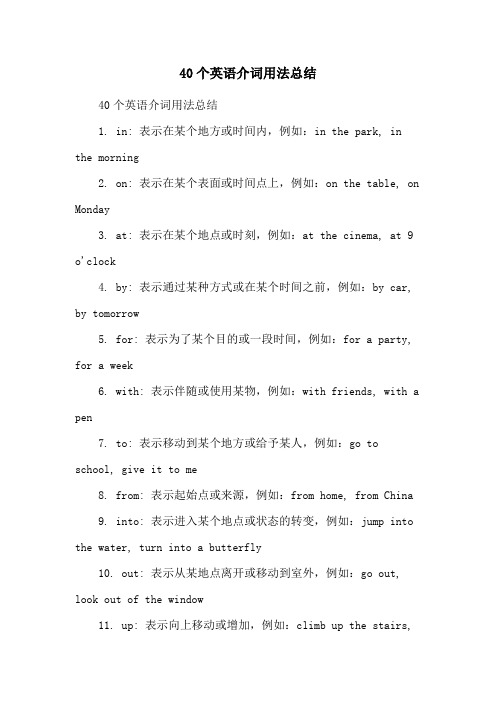
40个英语介词用法总结40个英语介词用法总结1. in: 表示在某个地方或时间内,例如:in the park, in the morning2. on: 表示在某个表面或时间点上,例如:on the table, on Monday3. at: 表示在某个地点或时刻,例如:at the cinema, at 9 o'clock4. by: 表示通过某种方式或在某个时间之前,例如:by car, by tomorrow5. for: 表示为了某个目的或一段时间,例如:for a party, for a week6. with: 表示伴随或使用某物,例如:with friends, with a pen7. to: 表示移动到某个地方或给予某人,例如:go to school, give it to me8. from: 表示起始点或来源,例如:from home, from China9. into: 表示进入某个地点或状态的转变,例如:jump into the water, turn into a butterfly10. out: 表示从某地点离开或移动到室外,例如:go out, look out of the window11. up: 表示向上移动或增加,例如:climb up the stairs,wake up12. down: 表示向下移动或减少,例如:walk down the hill, calm down13. about: 表示关于某事或在某个范围内,例如:talk about the movie, wander about the city14. off: 表示离开或关闭,例如:get off the bus, turnoff the lights15. on: 表示打开或激活,例如:turn on the TV, switch on the computer16. over: 表示越过或在某地上方,例如:jump over the fence, fly over the city17. under: 表示在某物下面或被控制或影响,例如:hide under the bed, live under his rules18. with: 表示具有某种特征或和某人一起做某事,例如:a man with blue eyes, dance with me19. without: 表示没有某物或在缺乏某物的情况下,例如:go without food, live without regret20. by: 表示通过某种方式,例如:learn by doing, go by bus21. through: 表示穿过某物或完成某事,例如:walk through the door, go through the documents22. across: 表示横穿某物或在某个范围内,例如:swimacross the river, all across the world23. between: 表示在两个事物之间或在某个时间段,例如:choose between two options, between 9 and 10 o'clock24. among: 表示在三个或三个以上事物之间或在某群人中,例如:share among friends, discuss among colleagues25. around: 表示在周围或在某个时间点附近,例如:walk around the park, around midnight26. through: 表示通过某事物或在某段时间内,例如:read through the book, work through the night27. against: 表示反对或靠在某物上,例如:fight against injustice, lean against the wall28. for: 表示代表或支持某人或某事,例如:vote for a candidate, fight for freedom29. towards: 表示朝向某个方向或对某人有好感,例如:walk towards the beach, feel towards someone30. within: 表示在某个时间或范围内,例如:arrive within an hour, within the city limits31. beyond: 表示超出某个界限或超过某个程度,例如:beyond expectations, beyond the horizon32. along: 表示沿着某个路线或伴随某人一起,例如:walk along the street, sing along with the song33. above: 表示在某物之上或高于某个程度,例如:flyabove the clouds, above average34. below: 表示在某物之下或低于某个程度,例如:swim below the surface, below freezing35. beside: 表示在某物旁边或和某人一起,例如:sit beside me, beside the lake36. near: 表示在某物附近或接近某个时间,例如:live near the beach, near the end37. past: 表示经过某个地点或在某个时间之后,例如:walk past the store, past midnight38. around: 表示在周围或大约某个数量,例如:look around the room, around 20 people39. after: 表示在某个时间之后或追求某人或某事,例如:after dinner, run after the dog40. before: 表示在某个时间之前或在某个事件之前,例如:before sunrise, before the meeting这些介词是英语中常用的一些基本介词,它们在表达地点、时间、方式等方面起到了重要的作用。
介词英语的用法总结
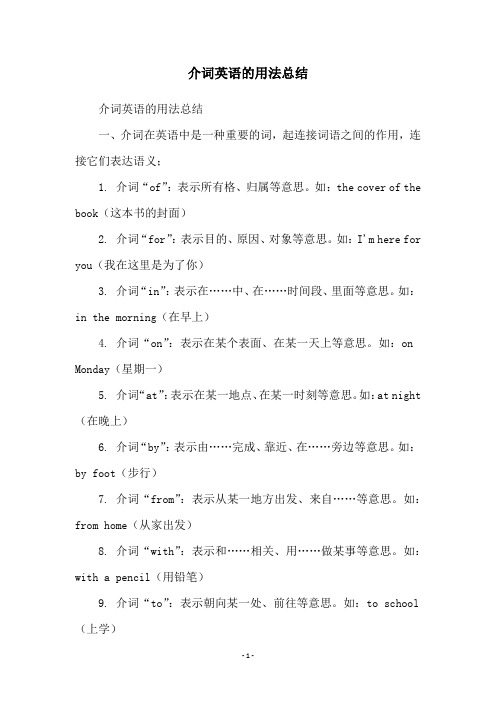
介词英语的用法总结介词英语的用法总结一、介词在英语中是一种重要的词,起连接词语之间的作用,连接它们表达语义;1. 介词“of”:表示所有格、归属等意思。
如:the cover of the book(这本书的封面)2. 介词“for”:表示目的、原因、对象等意思。
如:I'm here for you(我在这里是为了你)3. 介词“in”:表示在……中、在……时间段、里面等意思。
如:in the morning(在早上)4. 介词“on”:表示在某个表面、在某一天上等意思。
如:on Monday(星期一)5. 介词“at”:表示在某一地点、在某一时刻等意思。
如:at night (在晚上)6. 介词“by”:表示由……完成、靠近、在……旁边等意思。
如:by foot(步行)7. 介词“from”:表示从某一地方出发、来自……等意思。
如:from home(从家出发)8. 介词“with”:表示和……相关、用……做某事等意思。
如:with a pencil(用铅笔)9. 介词“to”:表示朝向某一处、前往等意思。
如:to school (上学)10.介词“for”:表示为了……、把……作为等意思。
如:for fun (为了好玩)11.介词“as”:表示作为、当……时等意思。
如:as a teacher (作为一个老师)12.介词“over”:表示在……上、穿过等意思。
如:over the bridge (过桥)13.介词“since”:表示从……起、既然等意思。
如:since then (从那时起)14.介词“into”:表示到……里面、转向等意思。
如:into the room(进房间)二、最后,需要强调的是,介词的使用要灵活搭配,以正确表达出英语句子的意思,以便达到更好的英语表达效果。
史上超全的英语介词用法归纳总结!不看太可惜了
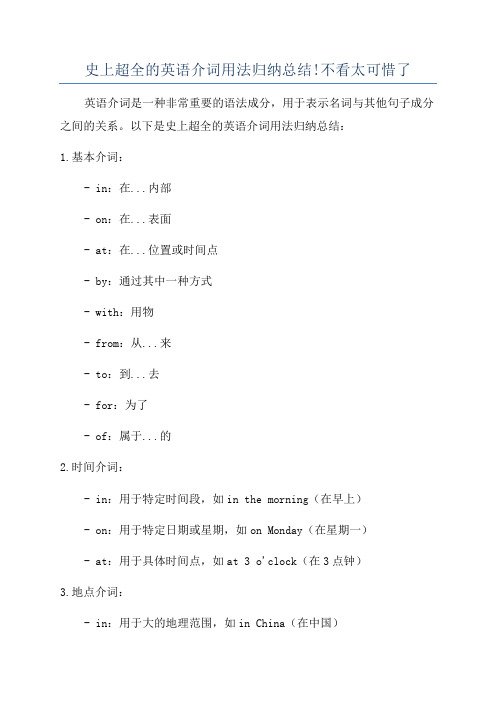
史上超全的英语介词用法归纳总结!不看太可惜了英语介词是一种非常重要的语法成分,用于表示名词与其他句子成分之间的关系。
以下是史上超全的英语介词用法归纳总结:1.基本介词:- in:在...内部- on:在...表面- at:在...位置或时间点- by:通过其中一种方式- with:用物- from:从...来- to:到...去- for:为了- of:属于...的2.时间介词:- in:用于特定时间段,如in the morning(在早上)- on:用于特定日期或星期,如on Monday(在星期一)- at:用于具体时间点,如at 3 o'clock(在3点钟)3.地点介词:- in:用于大的地理范围,如in China(在中国)- on:用于较小的地理范围或表面,如on the street(在街上)- at:用于具体地点,如at the supermarket(在超市)4.方向介词:- to:表示到达一些地方,如go to school(去学校)- into:表示进入一些地方,如go into the house(进入房子)- out of:表示离开一些地方,如get out of the car(离开车)5.原因介词:- because of:由于,如He is late because of the traffic(他因为交通堵塞而迟到)- due to:由于,如The flight was canceled due to bad weather(因为恶劣天气,航班被取消)6.动词短语介词:- look after:照顾,如She looks after her younger brother (她照顾她的弟弟)- take care of:照顾,如He takes care of his plants(他照顾他的植物)7.形容词短语介词:- interested in:对...感兴趣,如She is interested in music (她对音乐感兴趣)- good at:擅长...,如He is good at playing basketball(他擅长打篮球)8.其他常见介词用法:- with regard to:关于,如With regard to the matter, I have something to say(关于这件事,我有些话要说)- instead of:代替,如I will go instead of him(我将代替他去)- according to:根据,如According to the weather forecast, it will rain tomorrow(根据天气预报,明天会下雨)以上是一些常见的英语介词用法总结,希望能帮到你!。
英语介词的用法总结(完整版)
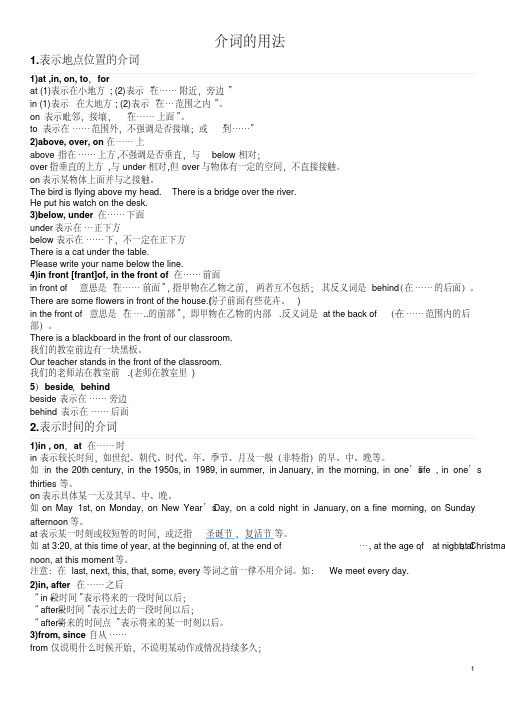
介词的用法1.表示地点位置的介词1)at ,in, on, to,forat (1)表示在小地方; (2)表示“在……附近,旁边”in (1)表示在大地方; (2)表示“在…范围之内”。
on 表示毗邻,接壤,“在……上面”。
to 表示在……范围外,不强调是否接壤;或“到……”2)above, over, on 在……上above 指在……上方,不强调是否垂直,与below相对;over指垂直的上方,与under相对,但over与物体有一定的空间,不直接接触。
on表示某物体上面并与之接触。
The bird is flying above my head. There is a bridge over the river.He put his watch on the desk.3)below, under 在……下面under表示在…正下方below表示在……下,不一定在正下方There is a cat under the table.Please write your name below the line.4)in front [frant]of, in the front of在……前面意思是“在……前面”,指甲物在乙物之前,两者互不包括;其反义词是behind(在……的后面)。
in front of…There are some flowers in front of the house.(房子前面有些花卉。
)in the front of 意思是“在…..的前部”,即甲物在乙物的内部.反义词是at the back of…(在……范围内的后部)。
There is a blackboard in the front of our classroom.我们的教室前边有一块黑板。
Our teacher stands in the front of the classroom.我们的老师站在教室前.(老师在教室里)5)beside,behindbeside 表示在……旁边behind 表示在……后面2.表示时间的介词1)in , on,at 在……时in表示较长时间,如世纪、朝代、时代、年、季节、月及一般(非特指)的早、中、晚等。
英语中常见介词用法总结
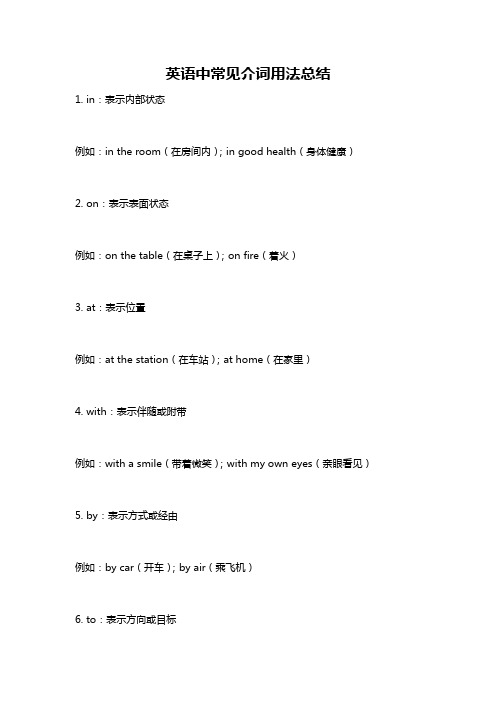
英语中常见介词用法总结
1. in:表示内部状态
例如:in the room(在房间内);in good health(身体健康)2. on:表示表面状态
例如:on the table(在桌子上);on fire(着火)
3. at:表示位置
例如:at the station(在车站);at home(在家里)
4. with:表示伴随或附带
例如:with a smile(带着微笑);with my own eyes(亲眼看见)5. by:表示方式或经由
例如:by car(开车);by air(乘飞机)
6. to:表示方向或目标
例如:to the park(去公园);to the moon(到月球)
7. from:表示出发地或来源
例如:from Beijing(来自北京);from the magazine(从杂志中)
8. for:表示目的或用途
例如:for a birthday party(为了生日派对);for writing(用于写作)
9. of:表示属于或关系
例如:the book of Harry Potter(哈利·波特的书);the sister of Mary(玛丽的姐姐)
10. with:表示具有或伴随
例如:a man with a gun(拿着枪的人);a girl with long hair(长发女孩)。
(完整版)英语中介词的用法
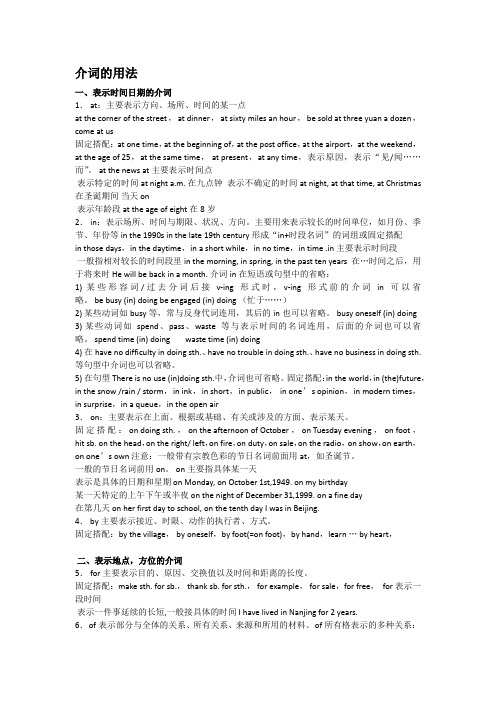
介词的用法一、表示时间日期的介词1.at:主要表示方向、场所、时间的某一点at the corner of the street,at dinner,at sixty miles an hour,be sold at three yuan a dozen,come at us固定搭配:at one time,at the beginning of,at the post office,at the airport,at the weekend,at the age of25,at the same time,at present,at any time,表示原因,表示“见/闻……而”。
at the news at主要表示时间点表示特定的时间at night a.m.在九点钟表示不确定的时间at night,at that time,at Christmas 在圣诞期间当天on表示年龄段at the age of eight在8岁2.in:表示场所、时间与期限、状况、方向。
主要用来表示较长的时间单位,如月份、季节、年份等in the1990s in the late19th century形成“in+时段名词”的词组或固定搭配in those days,in the daytime,in a short while,in no time,in time.in主要表示时间段一般指相对较长的时间段里in the morning,in spring,in the past ten years在…时间之后,用于将来时He will be back in a month.介词in在短语或句型中的省略:1)某些形容词/过去分词后接v-ing形式时,v-ing形式前的介词in可以省略。
be busy(in)doing be engaged(in)doing(忙于……)2)某些动词如busy等,常与反身代词连用,其后的in也可以省略。
15个英语最常见的介词用法-极简英语

15个英语最常见介词(in on at of for...)的深层次含义英文中15个最常见的介词in/ on/at/of/ for/by /with/ from/to/as/ about/ around/ off/ through/ over一、in (在..里面)1.表示真实的位置: in the car/room2表示抽象的位置: in the book/movie3.表示状态: in danger, in trouble; in anger3.表示时间: in the morning/afternoon/evening. in April; in 20104.表示方式: in the way; in English5.表示穿着: in black shoes/T-shirt二、on (紧紧地接触-连着)1.表示真实的位置: on the table/wall2.表示抽象的位置: on the radio/TV; on the topic/event3.表示具体的时间: on Monday; on Monday morning; on May 4th4.表示状态: on duty; on holiday; the game is on三、at(在.点上)1.表示真实的位置: at home/the company/the store2.表示抽象的位置: be good/bad at English3.表示具体的时间: at 3 pm;at night; at the age of 204.表示状态: at work-在工作; at table-在吃饭四、Of(的-从属关系)1.表示"无生命主体的":the window of the room; top of the mountain...2.某某市: the city of Bejing3.表示数量: a piece/bx/bottle/pair.. of五、for(为了/因为/对时间/对.而言/支持赞成)1.表示为了":go for a walk; I come here fr my schoolbag2.表示"因为": Thank you for helping me; for the reason3.表示"时间"和: for 3 days; for a week; for a year4.表示对..而言": It is important for me5.表示”支持,赞成": Are you for this plan or against it?六、by(通过.交通工具/在.附近/街至.时间/被)1.表示"通过.交通工具":by train/subway/plane/air/ship/seaI learn English by watchingEnglish movies.2.表示在附近":a table by the window; the house is by the lake3.表示"截至到..时间":by the end of next week; by 20194.表示"被(被动语态)":English is spoken by people all over the world.七、with (伴随)1.表示"和.起":go with:play with;make friends with;cooperate with2.表示"携有,带有":a county with a long history; a house with a big garden3.表示..工具:cut the apple with the knife4.表示"伴随":with the development of the society;with the help of my teacher;I don't have any cash with me.八、from (远离)1.表示"来自":I am/come from China;a gift from my best friend;a man from America2.由"远离"来记短语:stop/prevent/keep sb from doing sth阻止某人做某事be away from...远离...be different from与.不同be absent from缺席....how far is it from here?它离这远The paper is made from wood.这纸是由木头制成的3.表示..到": from...to...由"指向"来理解下列用法:The road leads to Paris.这条路通往巴黎Smoking is harmful to your health.吸烟有害健康the answer to the question.这个问题的答案九、to (指向..)contribute to对..做贡献on one's way to... 在某人去某地的路上belong to属于..be used to doing sth习惯于做某事lead to...导致十、as作为He works as a tour guide.他作为导游工作。
40个英语介词用法总结
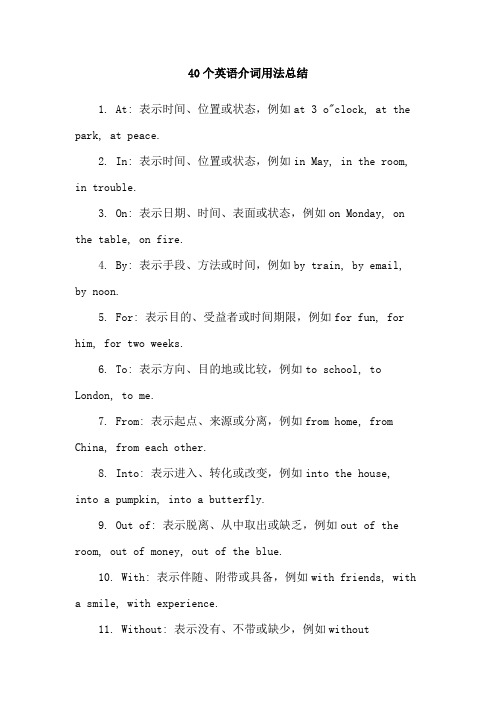
40个英语介词用法总结1. At: 表示时间、位置或状态,例如at 3 o"clock, at the park, at peace.2. In: 表示时间、位置或状态,例如in May, in the room, in trouble.3. On: 表示日期、时间、表面或状态,例如on Monday, on the table, on fire.4. By: 表示手段、方法或时间,例如by train, by email, by noon.5. For: 表示目的、受益者或时间期限,例如for fun, for him, for two weeks.6. To: 表示方向、目的地或比较,例如to school, to London, to me.7. From: 表示起点、来源或分离,例如from home, from China, from each other.8. Into: 表示进入、转化或改变,例如into the house,into a pumpkin, into a butterfly.9. Out of: 表示脱离、从中取出或缺乏,例如out of the room, out of money, out of the blue.10. With: 表示伴随、附带或具备,例如with friends, witha smile, with experience.11. Without: 表示没有、不带或缺少,例如withoutpermission, without shoes, without doubt.12. Over: 表示覆盖、超过或结束,例如over the roof, over the limit, over and done with.13. Under: 表示在下面、被支配或不足,例如under the table, under his control, under budget.14. About: 表示关于、大约或忙于,例如about the movie, about 10 dollars, about to leave.15. Above: 表示在上面、高于或超过,例如above the clouds, above average, above suspicion.16. Below: 表示在下面、低于或不足,例如below the surface, below freezing, below par.17. Across: 表示横穿、相交或涉及,例如across the street, across the board, across his mind.18. Beyond: 表示超出、远离或除了,例如beyond repair, beyond belief, beyond her control.19. Around: 表示周围、附近或环绕,例如around the corner, around the clock, around the world.20. Before: 表示以前、在前面或比较,例如before noon, before the house, before his time.21. Behind: 表示在后面、落后或背后,例如behind the house, behind schedule, behind the scenes.22. Beside: 表示在旁边、与...相比或附加,例如besidethe river, beside myself, beside the point.23. Inside: 表示内部、在里面或被包含,例如inside the box, inside the building, inside information.24. Outside: 表示外部、在外面或超出,例如outside the house, outside the box, outside the norm.25. Through: 表示穿过、经过或完成,例如through the door, through the park, through with it.26. Throughout: 表示遍布、贯穿或在整个期间,例如throughout the city, throughout history, throughout the day.27. Towards: 表示朝向、对于或接近,例如towards the sun, towards him, towards the end.28. Against: 表示反对、抵抗或紧挨着,例如against the law, against the current, against the wall.29. Among: 表示在...之中、相互之间或被分配到,例如among friends, among the stars, among the winners.30. Between: 表示在两者之间、在中间或相互之间,例如between two trees, between classes, between you and me.31. Within: 表示在内部、在范围之内或在规定时间内,例如within the house, within the budget, within a week.32. Without: 表示在外面、没有或不用,例如without the room, without a doubt, without further ado.33. Beneath: 表示在下面、低于或不足,例如beneath the surface, beneath his dignity, beneath contempt.34. Beside: 表示在旁边、与...相比或附加,例如beside the river, beside myself, beside the point.35. Into: 表示进入、转化或改变,例如into the house, into a pumpkin, into a butterfly.36. Upon: 表示在...之上、一旦发生或基于,例如upon the hill, upon arrival, upon further consideration.37. With: 表示伴随、附带或具备,例如with friends, witha smile, with experience.38. Within: 表示在内部、在范围之内或在规定时间内,例如within the house, within the budget, within a week.39. Without: 表示没有、不带或缺少,例如without permission, without shoes, without doubt.40. Beneath: 表示在下面、低于或不足,例如beneath the surface, beneath his dignity, beneath contempt.。
英语介词用法大全
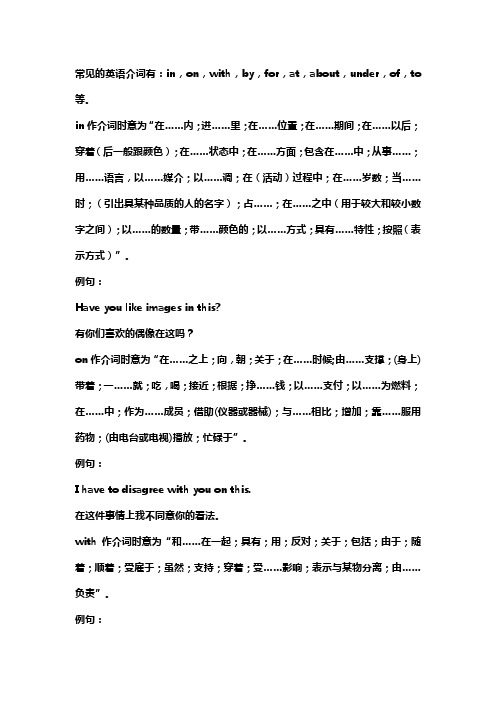
常见的英语介词有:in,on,with,by,for,at,about,under,of,to 等。
in作介词时意为“在……内;进……里;在……位置;在……期间;在……以后;穿着(后一般跟颜色);在……状态中;在……方面;包含在……中;从事……;用……语言,以……媒介;以……调;在(活动)过程中;在……岁数;当……时;(引出具某种品质的人的名字);占……;在……之中(用于较大和较小数字之间);以……的数量;带……颜色的;以……方式;具有……特性;按照(表示方式)”。
例句:Have you like images in this?有你们喜欢的偶像在这吗?on作介词时意为“在……之上;向,朝;关于;在……时候;由……支撑;(身上)带着;一……就;吃,喝;接近;根据;挣……钱;以……支付;以……为燃料;在……中;作为……成员;借助(仪器或器械);与……相比;增加;靠……服用药物;(由电台或电视)播放;忙碌于”。
例句:I have to disagree with you on this.在这件事情上我不同意你的看法。
with作介词时意为“和……在一起;具有;用;反对;关于;包括;由于;随着;顺着;受雇于;虽然;支持;穿着;受……影响;表示与某物分离;由……负责”。
例句:I am one with you on this.在这一点上,我和你的意见是一致的。
by作介词时意思是“由,被;通过;相差……;到……之前;在……旁边”。
例句:The telephone is by the window.电话在窗户旁边。
for作介词的时候,它翻译为“(表示对象、用途等)给,对;为了;关于;代表;受雇于;意思是;支持;因为;为得到;换取;就……而言;……后(更好、更快乐等);(表示去向)往;(安排或预定)在……时;对(某人)来说(困难、必需、愉快等);以……为价格;(表示一段时间)计;表示一系列事件之一。
例句:Can you translate this letter for me?你能为我翻译这封信吗?at(表示位置)在;在(某时间或时刻);以,达;向,朝。
(完整版)介词用法大全
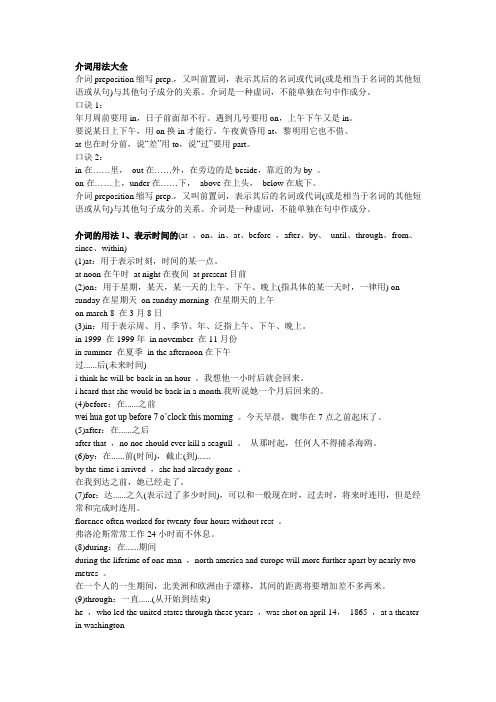
介词用法大全介词preposition缩写prep.,又叫前置词,表示其后的名词或代词(或是相当于名词的其他短语或从句)与其他句子成分的关系。
介词是一种虚词,不能单独在句中作成分。
口诀1:年月周前要用in,日子前面却不行。
遇到几号要用on,上午下午又是in。
要说某日上下午,用on换in才能行。
午夜黄昏用at,黎明用它也不借。
at也在时分前,说“差”用to,说“过”要用part。
口诀2:in在……里,out在……外,在旁边的是beside,靠近的为by 。
on在……上,under在……下,above在上头,below在底下。
介词preposition缩写prep.,又叫前置词,表示其后的名词或代词(或是相当于名词的其他短语或从句)与其他句子成分的关系。
介词是一种虚词,不能单独在句中作成分。
介词的用法1、表示时间的(at 、on、in、at、before ,after、by、until、through、from、since、within)(1)at:用于表示时刻,时间的某一点。
at noon在午时at night在夜间at present目前(2)on:用于星期,某天,某一天的上午、下午、晚上(指具体的某一天时,一律用) on sunday在星期天on sunday morning 在星期天的上午on march 8 在3月8日(3)in:用于表示周、月、季节、年、泛指上午、下午、晚上。
in 1999 在1999年in november 在11月份in summer 在夏季in the afternoon在下午过......后(未来时间)i think he will be back in an hour 。
我想他一小时后就会回来。
i heard that she would be back in a month.我听说她一个月后回来的。
(4)before:在......之前wei hua got up before 7 o’clock this morning 。
(完整版)英语中介词的用法
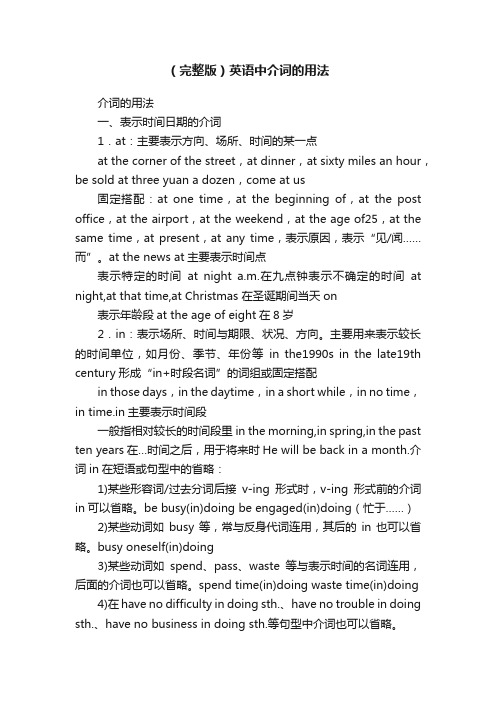
(完整版)英语中介词的用法介词的用法一、表示时间日期的介词1.at:主要表示方向、场所、时间的某一点at the corner of the street,at dinner,at sixty miles an hour,be sold at three yuan a dozen,come at us固定搭配:at one time,at the beginning of,at the post office,at the airport,at the weekend,at the age of25,at the same time,at present,at any time,表示原因,表示“见/闻……而”。
at the news at主要表示时间点表示特定的时间at night a.m.在九点钟表示不确定的时间at night,at that time,at Christmas 在圣诞期间当天on表示年龄段at the age of eight在8岁2.in:表示场所、时间与期限、状况、方向。
主要用来表示较长的时间单位,如月份、季节、年份等in the1990s in the late19th century形成“in+时段名词”的词组或固定搭配in those days,in the daytime,in a short while,in no time,in time.in主要表示时间段一般指相对较长的时间段里in the morning,in spring,in the past ten years在…时间之后,用于将来时He will be back in a month.介词in在短语或句型中的省略:1)某些形容词/过去分词后接v-ing形式时,v-ing形式前的介词in可以省略。
be busy(in)doing be engaged(in)doing(忙于……)2)某些动词如busy等,常与反身代词连用,其后的in也可以省略。
英语介词用法大全

英语介词用法大全一、介词preposition缩写prep,又叫前置词,表示其后的名词或代词(或是相当于名词的其他短语或从句)与其他句子成分的关系。
介词是一种虚词,不能单独在句中作成分。
二. 常用介词用法区分:1、in, on, to表示地理位置:in表示在某范围内,on指与什么毗邻,to指在某环境范围之外;2、on, in表示“在…上”时:on只表示在某物的表面上,in表示占去某物一部分;3、through, across都表示“穿过”时:through表示从内部通过,与in有关,across表示在表面上通过,与on有关;4、since, from表示表示时间时:since 指从过去到现在的一段时间,和完成时连用,from指从时间的某一点开始;5、in, on, at表示时间时:at表示片刻的时间,in表示一段的时间,on总是与日子有关;6、in, after表示时间时:in指在一段时间之后,after表示某一具体时间点之后或用在过去时的一段时间中;7、about, on表示“关于”时:about指涉及到,on指专门论述;8、besides与except表示“除了”:besides指“除了…还有再加上”,except指“除了,减去什么”,不放在句首;9、between与among表示“在两者之间”:between表示在两者之间,among用于三者或三者以上的中间;10、in, with表示“用”时:with表示具体的工具,in表示材料,方式,方法,度量,单位,语言,声音;11、in与into表示在里面:in通常表示位置(静态),into表示动向,不表示目的地或位置。
12、as与like:as意为“作为,以…地位或身份”,like为“象…一样”,指情形相似;三、介词用法口诀1、年月周前要用in,遇到几号用on,上午下午又是in.要说某日上下午,on换成in,午夜黄昏用at,黎明用它也不借。
at也在时分前,说“差”要用to,说“过”用part。
英语 介词用法
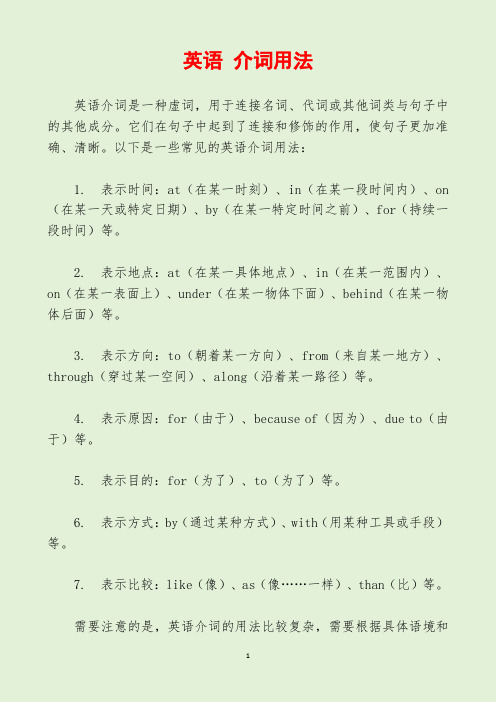
英语介词用法
英语介词是一种虚词,用于连接名词、代词或其他词类与句子中的其他成分。
它们在句子中起到了连接和修饰的作用,使句子更加准确、清晰。
以下是一些常见的英语介词用法:
1. 表示时间:at(在某一时刻)、in(在某一段时间内)、on (在某一天或特定日期)、by(在某一特定时间之前)、for(持续一段时间)等。
2. 表示地点:at(在某一具体地点)、in(在某一范围内)、on(在某一表面上)、under(在某一物体下面)、behind(在某一物体后面)等。
3. 表示方向:to(朝着某一方向)、from(来自某一地方)、through(穿过某一空间)、along(沿着某一路径)等。
4. 表示原因:for(由于)、because of(因为)、due to(由于)等。
5. 表示目的:for(为了)、to(为了)等。
6. 表示方式:by(通过某种方式)、with(用某种工具或手段)等。
7. 表示比较:like(像)、as(像……一样)、than(比)等。
需要注意的是,英语介词的用法比较复杂,需要根据具体语境和
句子结构来判断使用哪一个介词。
在学习和使用介词时,需要多读多练,逐渐掌握其用法。
英语介词用法及例句【全】
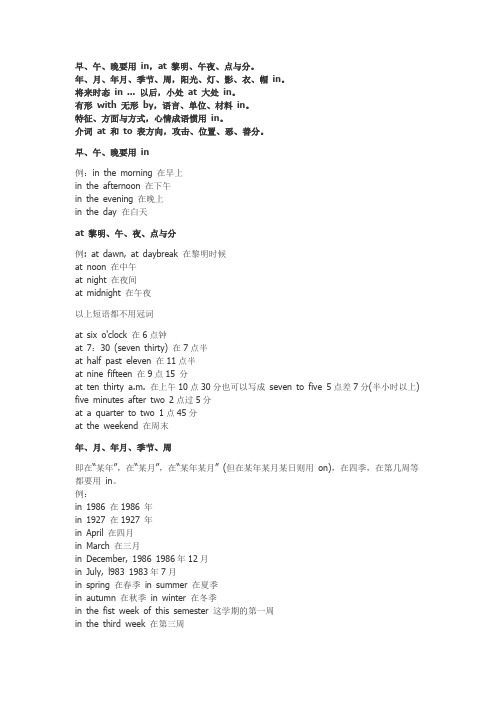
早、午、晚要用in,at 黎明、午夜、点与分。
年、月、年月、季节、周,阳光、灯、影、衣、帽in。
将来时态in ... 以后,小处at 大处in。
有形with 无形by,语言、单位、材料in。
特征、方面与方式,心情成语惯用in。
介词at 和to 表方向,攻击、位置、恶、善分。
早、午、晚要用in例:in the morning 在早上in the afternoon 在下午in the evening 在晚上in the day 在白天at 黎明、午、夜、点与分例: at dawn, at daybreak 在黎明时候at noon 在中午at night 在夜间at midnight 在午夜以上短语都不用冠词at six o'clock 在6点钟at 7:30 (seven thirty) 在7点半at half past eleven 在11点半at nine fifteen 在9点15 分at ten thirty a.m. 在上午10点30分也可以写成seven to five 5点差7分(半小时以上) five minutes after two 2点过5分at a quarter to two 1点45分at the weekend 在周末年、月、年月、季节、周即在“某年”,在“某月”,在“某年某月” (但在某年某月某日则用on),在四季,在第几周等都要用in。
例:in 1986 在1986 年in 1927 在1927 年in April 在四月in March 在三月in December, 1986 1986年12月in July, l983 1983年7月in spring 在春季in summer 在夏季in autumn 在秋季in winter 在冬季in the fist week of this semester 这学期的第一周in the third week 在第三周阳光、灯、影、衣、冒in,即在阳光下,在灯下,在树阴下,穿衣、着装、冒雨等都要用in。
英语中所有介词的用法
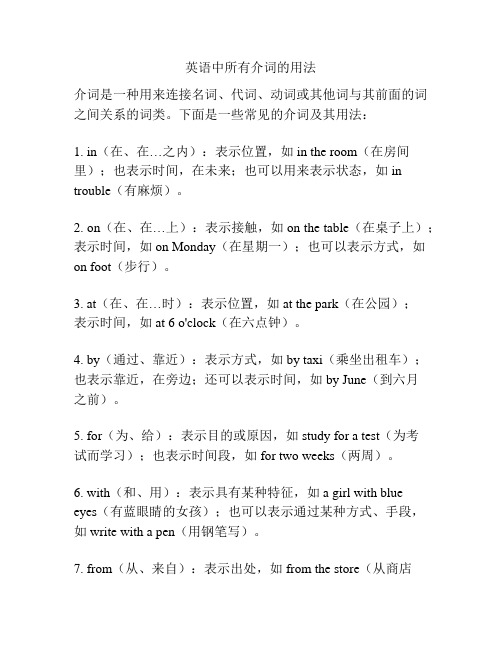
英语中所有介词的用法
介词是一种用来连接名词、代词、动词或其他词与其前面的词之间关系的词类。
下面是一些常见的介词及其用法:
1. in(在、在…之内):表示位置,如in the room(在房间里);也表示时间,在未来;也可以用来表示状态,如in trouble(有麻烦)。
2. on(在、在…上):表示接触,如on the table(在桌子上);表示时间,如on Monday(在星期一);也可以表示方式,如on foot(步行)。
3. at(在、在…时):表示位置,如at the park(在公园);
表示时间,如at 6 o'clock(在六点钟)。
4. by(通过、靠近):表示方式,如by taxi(乘坐出租车);也表示靠近,在旁边;还可以表示时间,如by June(到六月
之前)。
5. for(为、给):表示目的或原因,如study for a test(为考
试而学习);也表示时间段,如for two weeks(两周)。
6. with(和、用):表示具有某种特征,如a girl with blue
eyes(有蓝眼睛的女孩);也可以表示通过某种方式、手段,
如write with a pen(用钢笔写)。
7. from(从、来自):表示出处,如from the store(从商店
里);表示起点,如from London(从伦敦)。
8. to(到、向):表示目的地,如go to school(去学校);表示方向,如face to the north(面朝北方)。
这只是一部分介词的使用方法,介词的用法还有很多,需要根据具体语境来理解和运用。
英语介词用法及例句【全】
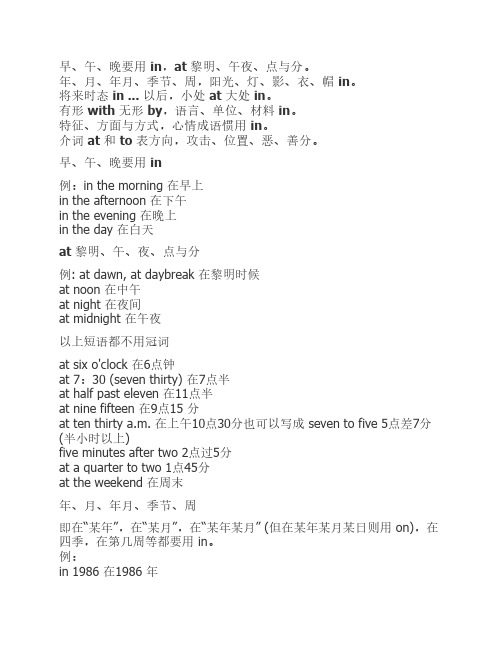
早、午、晚要用 in,at 黎明、午夜、点与分。
年、月、年月、季节、周,阳光、灯、影、衣、帽 in。
将来时态 in ... 以后,小处 at 大处 in。
有形 with 无形 by,语言、单位、材料 in。
特征、方面与方式,心情成语惯用 in。
介词 at 和 to 表方向,攻击、位置、恶、善分。
早、午、晚要用 in例:in the morning 在早上in the afternoon 在下午in the evening 在晚上in the day 在白天at 黎明、午、夜、点与分例: at dawn, at daybreak 在黎明时候at noon 在中午at night 在夜间at midnight 在午夜以上短语都不用冠词at six o'clock 在6点钟at 7:30 (seven thirty) 在7点半at half past eleven 在11点半at nine fifteen 在9点15 分at ten thirty a.m. 在上午10点30分也可以写成 seven to five 5点差7分(半小时以上)five minutes after two 2点过5分at a quarter to two 1点45分at the weekend 在周末年、月、年月、季节、周即在“某年”,在“某月”,在“某年某月” (但在某年某月某日则用 on),在四季,在第几周等都要用 in。
例:in 1986 在1986 年in 1927 在1927 年in April 在四月in March 在三月in December, 1986 1986年12月in July, l983 1983年7月in spring 在春季 in summer 在夏季in autumn 在秋季 in winter 在冬季in the fist week of this semester 这学期的第一周in the third week 在第三周阳光、灯、影、衣、冒 in,即在阳光下,在灯下,在树阴下,穿衣、着装、冒雨等都要用 in。
重点介词用法归纳
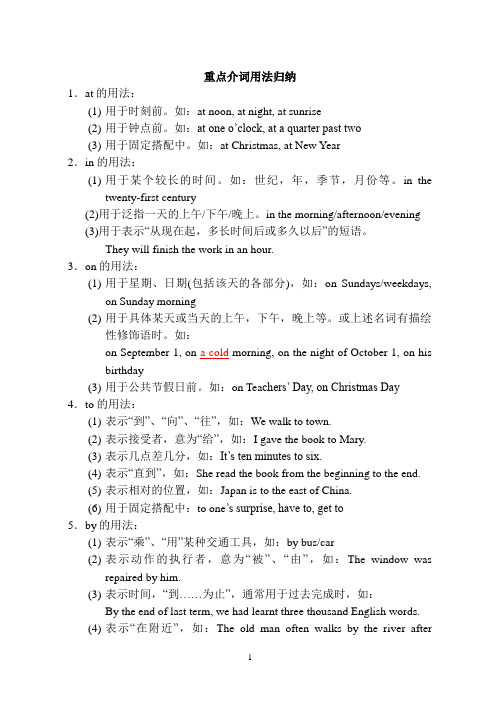
重点介词用法归纳1.at的用法:(1)用于时刻前。
如:at noon, at night, at sunrise(2)用于钟点前。
如:at one o’clock, at a quarter past two(3)用于固定搭配中。
如:at Christmas, at New Year2.in的用法:(1)用于某个较长的时间。
如:世纪,年,季节,月份等。
in thetwenty-first century(2)用于泛指一天的上午/下午/晚上。
in the morning/afternoon/evening(3)用于表示“从现在起,多长时间后或多久以后”的短语。
They will finish the work in an hour.3.on的用法:(1)用于星期、日期(包括该天的各部分),如:on Sundays/weekdays,on Sunday morning(2)用于具体某天或当天的上午,下午,晚上等。
或上述名词有描绘性修饰语时。
如:on September 1, on a cold morning, on the night of October 1, on hisbirthday(3)用于公共节假日前。
如:on Tea chers’ Day, on Christmas Day4.to的用法:(1)表示“到”、“向”、“往”,如:We walk to town.(2)表示接受者,意为“给”,如:I gave the book to Mary.(3)表示几点差几分,如:It’s ten minutes to six.(4)表示“直到”,如:She read the book from the beginning to the end.(5)表示相对的位置,如:Japan is to the east of China.(6)用于固定搭配中:to one’s surprise, have to, get to5.by的用法:(1)表示“乘”、“用”某种交通工具,如:by bus/car(2)表示动作的执行者,意为“被”、“由”,如:The window wasrepaired by him.(3)表示时间,“到……为止”,通常用于过去完成时,如:By the end of last term, we had learnt three thousand English words.(4)表示“在附近”,如:The old man often walks by the river aftersupper.6.with的用法:(1)表示并列关系,意为“和”、“和……一起”,如:Can you come toplay football with us?(2)表示“带有”、“具有”,如:China is a large country with a long history.I like tea with nothing in it.(3)表示使用的工具、手段,意为“用”:如:He is writing with a pen.(4)表示行为的对象,意为“对着”、“就……来说”,如:Our English teacher is always strict with us.The boy is very pleased with his performance.His parents were angry with him because he did badly in the exam.(5)表示随身携带:It looks like rain. You’d better take a raincoat with you.7.without的用法:(1)without用以表示“没有”、“没有带(吃,穿,戴等)”。
- 1、下载文档前请自行甄别文档内容的完整性,平台不提供额外的编辑、内容补充、找答案等附加服务。
- 2、"仅部分预览"的文档,不可在线预览部分如存在完整性等问题,可反馈申请退款(可完整预览的文档不适用该条件!)。
- 3、如文档侵犯您的权益,请联系客服反馈,我们会尽快为您处理(人工客服工作时间:9:00-18:30)。
介词用法大全(一)一、口诀早、午、晚要用in,at黎明、午夜、点与分。
年、月、年月、季节、周,阳光、灯、影、衣、冒in。
将来时态in...以后,小处at大处in。
有形with无形by,语言、单位、材料in。
特征、方面与方式,心情成语惯用in。
介词at和to表方向,攻击、位置、恶、善分。
日子、日期、年月日,星期加上早、午、晚,收音、农场、值日on,关于、基础、靠、著论。
着、罢、出售、偷、公、假,故意、支付、相反,准。
特定时日和“一……就”,on后常接动名词。
年、月、日加早、午、晚,of之前on代in。
步行、驴、马、玩笑on,cab,carriage则用in。
at山脚、门口、在当前,速、温、日落、价、核心。
工具、和、同随with,具有、独立、就、原因。
就……来说宾译主,对、有、方状、表细分。
海、陆、空、车、偶、被by,单数、人类know to man。
this、that、tomorrow,yesterday,next、last、one。
接年、月、季、星期、周,介词省略已习惯。
over、under正上下,above、below则不然,若与数量词连用,混合使用亦无关。
‘beyond超出、无、不能,against靠着,对与反。
besides,except分内外,among之内along沿。
同类比较except,加for异类记心间。
原状because of,、owing to、due to表语形容词under后接修、建中,of、from物、化分。
before、after表一点, ago、later表一段。
before能接完成时,ago过去极有限。
since以来during间,since时态多变换。
与之相比beside,除了last but one。
复不定for、找、价、原,对、给、段、去、为、作、赞。
快到、对、向towards,工、学、军、城、北、上、南。
but for否定用虚拟,复合介词待后言。
ing型由于鉴,除了除外与包合。
之后、关于、在......方面,有关介词须记全。
in内to外表位置,山、水、国界to在前。
二、用法如大体掌握如上介调用法口诀,就不易出错。
当然,至于介词的详尽用法,同形词又是连词及副词等内容此章不讲。
下面对该口诀分别举例帮助你理解消化。
早、午、晚要用in例:in the morning 在早上in the afternoon 在下午in the evening 在晚上in the day 在白天at黎明、午、夜、点与分例: at dawn, at daybreak 在黎明时候at noon 在中午at night 在夜间at midnight 在午夜以上短语都不用冠词at six o"clock 在6点钟at 7:30 (seven thirty) 在7点半at half past eleven 在11点半at nine fifteen 在9点15分at ten thirty a.m. 在上午10点30分也可以写成seven to five 5点差7分(半小时以上)five minutes after two 2点过5分at a quarter to two 1点45分at the weekend 在周末年、月、年月、季节、周即在“来年”,在“某月”,在“某年某月”(但在某年某月某日则用on),在四季,在第几周等都要用in。
例;in 1986 在1986年in 1927 在1927年in April 在四月in March 在三月in December 1986 1986年12月in July l983 1983年7月in spring 在春季in summer 在夏季in autumn 在秋季in winter 在冬季in the fist week of this semester 这学期的第一周in the third week 在第三周阳光、灯、影、衣、冒in,即在阳光下,在灯下,在树阴下,穿衣、着装、冒雨等都要用in。
例:Don"t read in dim light. 切勿在暗淡的灯光下看书。
They are reviewing their lessons in the bright light. 他们在明亮的灯光下复习功课。
They are sitting in the shade of a tree. 他们坐在树阴下乘凉。
a prisoner in irons 带着镣铐的囚犯He went in the rain to meet me at the station. 他冒雨到车站去接我。
The poor dressed (clothed) in rags in old society. 旧社会穷人们衣衫褴褛.以及:in the bright sunlight 在明亮的阳光下a merchant in disguise 乔装的商人the woman in white (black, red, yellow) 穿着白(黑、红、黄)色衣服的妇女in uniform 穿着制服in mourning 穿着丧服in brown shoes 穿着棕色鞋in his shirt sleeves 穿着衬衫将来时态in...以后例: They will come back in 10 days. 他们将10天以后回来。
I"ll come round in a day or two. 我一两天就回来。
We"ll be back in no time. 我们一会儿就回来。
Come and see me in two days" time. 两天后来看我。
(从现在开始)=================================================================介词用法大全(二)after... (从过去开始)小处at大处in例:Li and I arrived at Heishan county safe and sound, all is well. Don"t worry.李和我平安地到达黑山县,一切很好,勿念。
I live in a great city (big city), my sister lives at a small town while my parents live at a village. 我住在大城市,我姐姐住在一个小城镇,而我的父母则住在农村。
I"m in Liaoning, at Anshan. 我住在辽宁省鞍山市.有形with无形by,语言、单位、材料in例:The workers are paving a road with stone. 工人们正用石子铺路。
(有形) The teacher is correcting the paper with a new pen.。
(有形)Taking Tiger Mountain by Strategy" is a good opera.《智取威虎山》是—出好戏。
(无形) The product is separated by distilation into gasoline and gas oil. 这种产品是用蒸馏分离出气油和粗柴油。
(表示方式、手段、方法—无形)I really can"t express my idea in English freely in-deed.我确实不能用英语流利地表达我的思想。
(表示某种语言用in)I wrote a novel in Russian. 我用俄语写了一本小说。
(同上)The kilometer is the biggest unit of length in the metric system.公里是米制中最长的长度单位。
(表示度、量、衡单位的用in )The length is measured in meter, kilometre, and centimetre. 长度是以米、公里、厘米为单位来计算的。
(同上)This board was cast in bronze not in gold. 这个牌匾是铜铸的,不是金铸的。
特征、方面与方式、心情、成语惯用in特征或状态:例:The Democratic Party was then in power. 那时民主党执政。
They found the patient in a coma. 他们发现病人处于昏迷状态。
He has not been in good health for some years. 他几年来身体一直不好。
Many who came in despair went away in hope. 许多人带着绝望情绪而来,却满怀希望而去。
The house was in ruins. 这房屋成了废墟。
The poor girl was in tears. 这个贫苦女孩泪流满面。
Her clothes were in rags. 她的衣跟穿破了。
His shoes were in holes. 他的鞋穿出窟窿了。
I only said it in fun. 我说这话只是开玩笑的。
She spoke in grief rather than in anger. 与其说她讲得很气愤,不如说她讲得很伤心。
还有一些短语也用in,如:in jest 诙谐地,in joke 开玩笑地,in spite 恶意地,in fairness 公正地,in revenge 报复,in mercy 宽大,in sorrow 伤心地等。
His mind was in great confusion. 他脑子里很乱。
Today everybody is in high spirits and no one is in low ebb. 今天大家都兴高采烈,没有一个情绪低落的。
She and her classmates are in flower ages. 她和她的同学都正值妙龄。
The compaign was in full swing. 运动正值高潮中。
方面:例:we accepted the item in principle. 我们在原则上接受了这个条款。
They are never backward in giving their views. 他们从来不怕发表自己的意见。
The backward area has achieved self-sufficient in grain. 这个落后的地区在粮食方面已能自给。
A good teacher must be an example in study. 一个好的教师必须是学习的模范。
